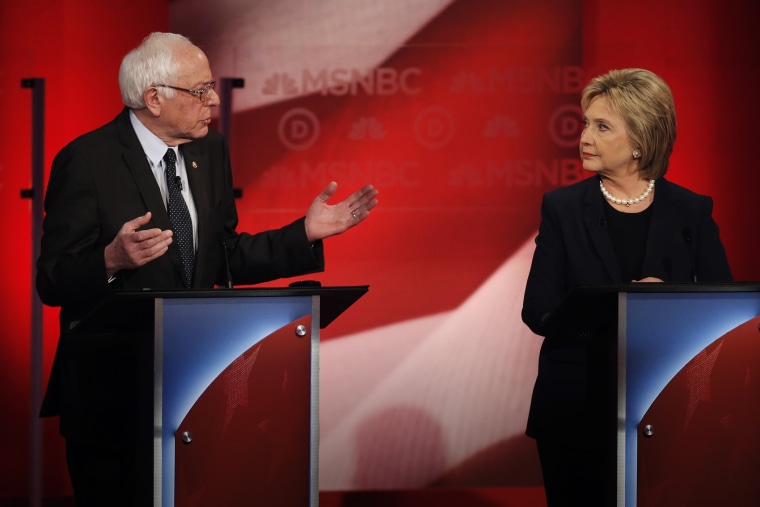When news reports popped up yesterday about the Democratic National Committee and Hillary Clinton facing accusations about an illegal fundraising scheme, I largely assumed the charges were being levied from the right. As
Rachel noted on the show last night, those assumptions were incorrect.
In a letter to the Democratic National Committee, a lawyer for Sanders said the joint committee, which can accept far larger donations than Clinton's campaign, appeared to be improperly subsidizing her campaign by paying Clinton staffers with funds from the committee and cited other alleged violations as well. [...] The Sanders letter cited a February report by The Washington Post that detailed the Clinton campaign's expansive use of a joint fundraising committee it set up last year with the DNC and 32 state party committees.
To put it mildly, it's not at all common for a Democratic presidential candidate to accuse his own ostensible party, late in the primary process, of being involved in an illegal scheme, but 2016 really isn't a normal year.
Regardless, do the accusations have merit? Have the DNC and the Clinton campaign hatched an improper operation that violates campaign-finance laws? It's a real stretch.
Right off the bat, it's worth noting that the Democratic National Committee offered Team Sanders the identical opportunity for a joint fundraising operation, but the senator declined -- not because the joint victory fund is illegal, but because Sanders preferred to simply do his own thing, separate from the national party.
Also note, it's not altogether clear how serious the Sanders campaign is about the allegations themselves. The "proof" of wrongdoing is a Washington Post article from two months ago, which doesn't actually point to any specific misdeeds, and there's been no explanation as to why Sanders waited two months to complain about it.
What's more, the Sanders campaign didn't take its complaints to the Federal Election Commission, which is responsible for reviewing such allegations, but rather, to the DNC itself -- the entity that already believes there's nothing improper about its own operation.
It didn't help matters when, less than 30 minutes after making the accusations, the Sanders campaign sent out
a new fundraising message to its donors, asking for more financial contributions in response to the allegations.
But even putting all of that aside, is there any reason to believe the DNC/Clinton operation is legally problematic in any way? Clinton campaign officials responded that the accusations have no merit, but that's what everyone would expect them to say. What about objective observers?
Andrea Mitchell
said on the show last night that Larry Noble, who served as the FEC's general counsel for 13 years, believes the allegations don't make a lot of sense. Rick Hasen, an elections law expert,
added yesterday that Team Sanders seems to have a "weak" case.
Clinton, like Sanders and other presidential candidates, has set up a joint fundraising committee with her political party. The JFC allows you to raise a huge chunk of change (more now than in past campaigns, thanks to the Supreme Court blowing out the aggregate federal limits in the McCutcheon case). A small bit goes to the candidate's committee under the federal limits (currently $2,700 for the primary and $2,700 for the general). The next bit goes to the DNC, and the rest so state parties in $10,000 chunks. Sanders is accusing the joint committee of raising really big donations, and then having the JFC using some of those really big donations to engage in direct mail and internet targeting of small donors. When those small donors donate small amounts, contributions up to the first $2,700 benefit Clinton under the JFC agreement, and because these are small donors, it means Clinton gets all that small donor money. The [Sanders campaign's] letter cites no authority showing that this use of the JFC is not allowed, and it is hard to see what provision of the law it violates when donors give only small amounts that happen to benefit only Clinton. The letter says that maybe this is like an in-kind contribution from the DNC to the Clinton campaign, but I don't see how it is that if the money is coming from the JFC not from the committee. The letter even says this means that those giving big checks to the DNC might thereby be giving more than the $2,700 to Clinton, which is not literally true -- it is what the JFC is doing with the money, over which the donors have no control.
So, the accusations themselves appear difficult to defend, but maybe there's a political upside to this?
I'm not sure what that would be. It's certainly possible that raising allegations, even baseless ones, might give Sanders yet another fundraising boost, though given the recent success of his fundraising juggernaut, that may not make much of a material difference.
Complicating matters, the Sanders campaign has made no secret of the fact that it hopes to persuade Democratic officials to elevate the Vermont senator, regardless of the results from the nominating contests. It's a bold request, made more difficult when Sanders accuses the Democratic Party of hatching an illegal fundraising scheme that doesn't appear to exist.
